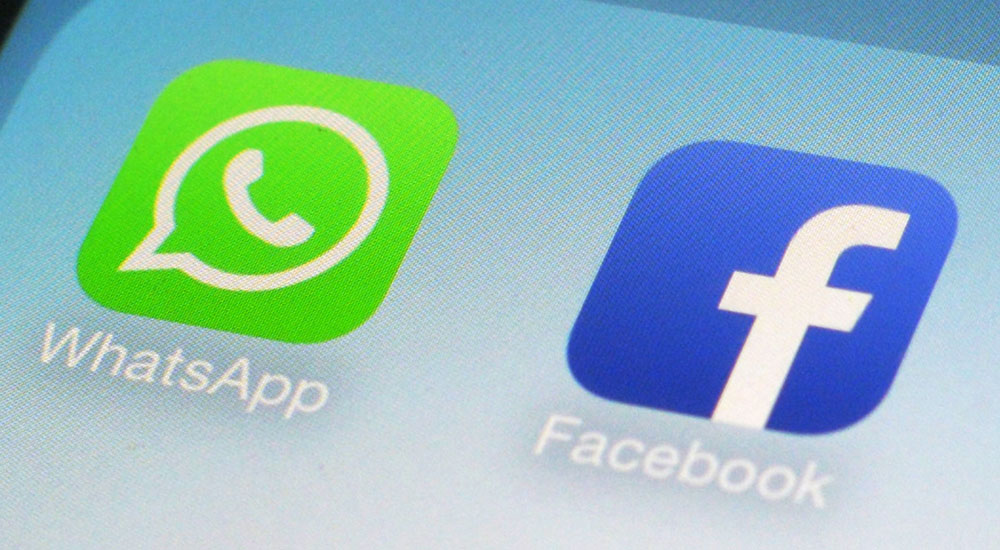Facebook mega-deal for WhatsApp ‘a brilliant move’

Facebook’s $19-billion deal for the red-hot mobile messaging service WhatsApp is a savvy strategic move by the world’s biggest social network, even if the price tag is staggeringly high, analysts say. AP
WASHINGTON—Facebook’s $19-billion deal for the red-hot mobile messaging service WhatsApp is a savvy strategic move by the world’s biggest social network, even if the price tag is staggeringly high, analysts say.
The agreement unveiled Wednesday—seen as the largest for a venture-backed tech startup—gives Facebook entry into emerging markets and importantly keeps the free-messaging app out of the hands of rivals such as Google.
“Although the deal appears to be pricey… we think that it has compelling strategic logic,” Shebly Seyrafi at FBN Securities said in a research note Thursday.
While Facebook is paying a high price by any measure, Seyrafi said “we see other benefits to the deal,” pointing out WhatsApp’s big user base in countries such as Brazil, South Africa and China.
“We think that in addition to the revenue obtainable from WhatsApp itself, Facebook will benefit from better integration… that will make Facebook more engaging while driving further growth internationally and in mobile,” the analyst said.
Facebook shares shook off early declines and rose 2.3 percent to close at $69.63, despite the fact that the company is diluting its value with the massive cash-and-stock acquisition.
The purchase includes $12 billion in Facebook shares and $4 billion cash. It calls for an additional $3 billion in restricted stock units to be granted to WhatsApp founders and employees that will vest over four years.
Analyst Stephen Ju at Credit Suisse said the move appears to make sense from a long-term viewpoint.
“Looking past the sticker shock of $19 billion… we view this as an offensive move to gain additional share of the consumer’s time spent—which should engender additional opportunities for monetization,” he said.
Key in emerging economies
Trip Chowdhry at Global Equities Research called the move a “very smart and an essential acquisition for Facebook,” because WhatsApp works on less expensive “feature phones” still predominant in emerging economies such as India.
“Most of the developing world still is on the feature phone, as the majority cannot afford a smartphone,” Chowdhry said.
“WhatsApp is the only application that runs equally well on feature phones and on smartphones.”
Deutsche Bank analyst Ross Sandler said Facebook’s acquisition of WhatsApp “solidifies its position as the top company in mobile globally” excluding China, where Facebook is banned.
Sandler said that even though Facebook is not planning to deliver ads on WhatsApp for now, this may change over time.
“We believe that as users become accustomed to native mobile advertising and as the quality of the various monetization strategies improve, we expect opportunities to emerge,” he said in a note to clients.
Victor Anthony at Topeka Capital Markets said the deal will help diversify Facebook with a broader set of mobile services.
“As was the case with PayPal, YouTube and Instagram, hindsight will be the best judge of how valuable this acquisition will be,” Anthony said in a research note.
“The valuation appears reasonable on a per user basis. From what we see, the acquisition makes strategic sense and the combined company will likely accelerate user growth of both platforms, similar to what we see with Instagram.”
Staving off Google threat
Jack Kent at IHS Technology said the move helps Facebook “neutralize a competitive threat.”
“To understand Facebook’s rationale, the focus must be on the cost of Facebook not buying WhatsApp rather than the price Facebook paid for WhatsApp,” Kent said.
“Facebook could not risk WhatsApp’s 450 million monthly and 315 million daily active users falling into the hands of a competitor such as Google.”
Fellow IHS analyst Eleni Marouli said the deal allows Facebook to get better data on users worldwide, which has value in itself.
“WhatsApp’s strong presence in key emerging markets such as Brazil and India will provide Facebook with insights in countries that are still largely under-monetized,” Marouli said.
“Building good mobile data on consumers in these markets is essential as they are not only mobile-first in their use of the Internet, but often mobile-only.”
Youssef Squali at Cantor Fitzgerald pointed out that Facebook may be able to use WhatsApp to create a new kind of telecom service which has not existed so far.
“While WhatsApp is currently a cross-platform mobile messaging service, it is likely to morph into a gateway for global calling and video solutions over time, dramatically expanding its revenue potential,” the analyst said.—Rob Lever